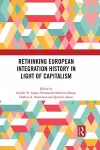
Rethinking European Integration History in Light of Capitalism
4 contributors - Hardback
£145.00
Aurélie D. Andry is Research Fellow at Université Paris-Saclay and a member of the ANRDFG-funded project ‘Workplace democracy: a European ideal?: discourses and practices about the democratization of work after 1945’. Her research focuses mainly on the history of European integration and the history of socialism and trade unionism in Europe.
Emmanuel Mourlon-Druol is Professor of International Economic History at the University of Glasgow, and Non Resident Fellow at the Brussels-based think tank Bruegel. Prior to coming to the University of Glasgow, Emmanuel held the Pinto Postdoctoral fellowship at the London School of Economics (LSE). He is the author of A Europe Made of Money: the Emergence of the European Monetary System (2012) and co-editor of International Summitry and Global Governance: the Rise of the G-7 and the European Council, 1974–1991 (with Federico Romero, Routledge 2014). His work has appeared in Business History, Contemporary European History, JCMS: Journal of Common Market Studies and West European Politics, among others.
Haakon A. Ikonomou is Gerda Henkel Fellow and Teaching Associate Professor at the Saxo Institute, University of Copenhagen. Ikonomou is co-founder and steering committee member of Global Biography Working Group (GloBio), review and online media editor of Diplomatica (Brill) and the New Diplomatic History Network, and co-director of the Europe and International Cooperation Research Group at the Centre for Modern European Studies (CEMES).
Quentin Jouan is a strategy consultant and a guest lecturer in different Belgian universities. As a consultant, he is supporting public and private organisations in defining long-term strategies and coping with regulatory, environmental and societal challenges. As a lecturer, Quentin is teaching Belgian and European institutional history. His research area focuses on the socio-economic interplay between national actors and European institutions as well as on the history of the legal regulation of capitalism.